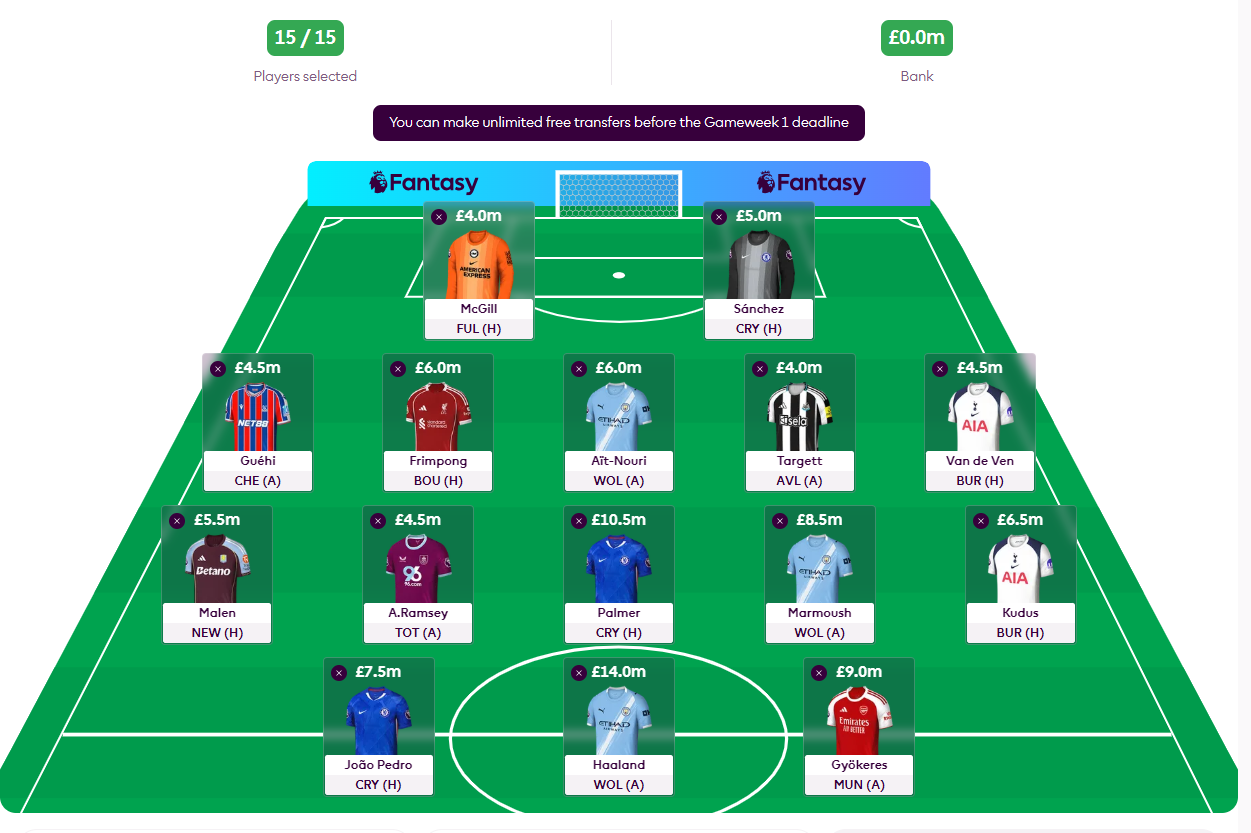22 Aug 2025
Squad Selections: Football ManAIger

Will AI take over football? Which AI model would make the best manager? And can they consistently defeat a human opponent? Those are the questions this experiment is seeking to answer.
Having selected their own teams based entirely on their own research, what’s the result of their initial squad selections?
The first question of course, was could they even get to the point of understanding the rules and selecting a valid team? Of the eight leading AI models included, six successfully managed to understand the rules, assess the player list and select their squad. Two models fell at the first hurdle: unable to browse or understand the FPL rules, or failing to produce a valid team – mainly due to referencing last season’s player list. Oh, and some of them just couldn’t add up. Of the six that remained, the competition was well and truly on.
What did we see in their squad selection?
Across all six AI teams, representing a possible 90 individual player choices from a list of 666 premier league players, only 52 individual players were selected – with a number of AI models taking a similar approach to both strategy and squad selection.
When it came to the most popular pick, all six AI managers selected Ollie Watkins. This was in contrast to the wider FPL community, where only 26.4% of human managers selected the talismanic Villa striker.
However, the models were very much aligned with their human counterparts when it came to the next most popular choice, with five of six teams selecting Chelsea playmaker Cole Palmer – chosen by 61.6% of human managers.
Four of six models selected both Mo Salah and Palmer as the core of their team, these two players representing 25% of their total budget.
One of the most popular players among human managers, Chelsea’s João Pedro – he of Watford fame and selected by 54.3% of FPL managers (making him the joint-second most popular player with Salah) – was selected by just one AI.
Alongside Liverpool legend Virgil Van Dyke, and Spurs stalwart Micky Van de Ven, the remaining joint most popular defender was in fact Burnley’s Maxime Estève – all of whom were selected by four of six AI managers. The most popular defender chosen by human managers was new Liverpool full back Jeremie Frimpong, who was snubbed by all six AI gaffers.
Not a single Bournemouth player was selected, the only Premier League team for which this was the case. Among human managers, the most popular Bournemouth player was Antoine
Semenyo, and based on week one performance at least, the AIs may well have missed a trick.
One model either didn’t understand or ignored the current situation, and selected Alexander Isak; similarly one model selected James Maddison, despite the news of his injury already being widely circulated at time of squad selection.
The overall impression of these squad choices is that they were reasonably conservative. Most AIs followed the same strategy: cheap-out the bench as far as possible, then go for tried and trusted big hitters and safe mid-level picks for the starting XI. Likewise when asked to chose their own team names, they all selected relatively bland monikers – very much 50s football comic rather than 90s counter-culture.
The magic in the machine?
When you look at the overall selections of the six models that made it, it’s fair to say the one thing we didn’t obviously see in their selections was genuine innovation and creative thinking – a strategy, plan or pick that focused on the differential approach, spotting the hidden gems others had ignored.
No Moneyball here.
So on the face of it at least, in the initial squad selection we didn’t see any evidence of these AI managers re-writing the rules, finding those players that the human eye missed or that unique strategy which the pundits, experts and bloggers had ignored. There didn’t appear to be any magic in the machine.
Which, to many in the industry, may not come as a huge surprise.
But a week is a long time in football, and a whole season is a potential eternity for the computing power of AI. So this is just the beginning.
You can follow their progress, take a look at their teams and view the ‘Scout Digital AI Championship’ league table here.
